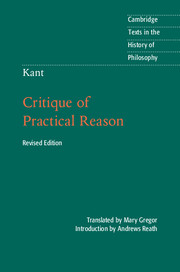Introduction
Published online by Cambridge University Press: 05 February 2015
Summary
The Critique of Practical Reason, published in 1788, is the second of Kant’s three Critiques, falling between the Critique of Pure Reason (first edition: 1781, second edition: 1787) and the Critique of Judgment (1790). It is also the second of his three major works devoted to moral theory, along with the Groundwork of the Metaphysics of Morals (1785) and the Metaphysics of Morals (1797). These works develop an account of morality that reacts to those found in both the empiricist and the rationalist traditions, and together they constitute Kant’s lasting contribution to moral theory.
Certain remarks in the Groundwork suggest that Kant did not originally plan a separate critique of practical reason. He notes that although a critique of practical reason is the only foundation for a metaphysics of morals (i.e. a systematic classification of human duties on a priori grounds), the need for critique is less pressing in the case of practical reason than it is for speculative reason, and that an outline of such a critique would suffice for his purposes. In moral thought, ordinary reason is more easily brought “to a high degree of correctness and precision” in that authoritative practical principles are revealed through the workings of ordinary moral consciousness, while in its “pure but theoretical use, reason is wholly dialectical,” tending to make illusory and illegitimate metaphysical claims. Furthermore, executing a critique of practical reason would introduce complexities not absolutely necessary to a presentation of the basic principle of duty [G 4: 391]. The idea of writing a separate critique of practical reason appears to have occurred to Kant while he was revising the Critique of Pure Reason for its second edition.
- Type
- Chapter
- Information
- Kant: Critique of Practical Reason , pp. vii - xxxivPublisher: Cambridge University PressPrint publication year: 2015
References
- 1
- Cited by

